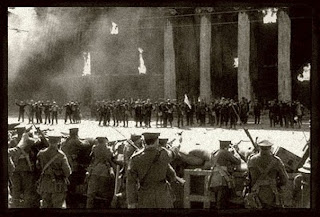 The Crossans - Hellraisers of Castlemilk
The Crossans - Hellraisers of CastlemilkOur hellraising ways always manages to come back

 MY TALE OF TWO CITIES
MY TALE OF TWO CITIES"The Crossans - Hellraisers of Castlemilk" A tale of murder, madness (schizophrenia), mayhem - The simple story of a scottish family, my family, spanning the 20th century (1900-2000). A close-knit family of 9 brothers/2 sisters from the "Gorbals"- they were a working class family of miners, war heroes, athletes,
 HELLRAISERS...
HELLRAISERS...  CALL OF THE WILD
CALL OF THE WILD
Jack London
(Origin - Glasgow, Scotland/Dublin, Ireland - Irish Catholic).

My tale of two cities -
During the early 1900s strikes in the Scottish coal mines, on the railways, and on the docks paralyzed the economy and showed the power of a unified labor movement. Government attempts to break the unions not only failed, they instilled greater resolve in those who were arrested, locked out of their jobs, or denied employment because of their union activities. The Labor Party was created to gain representation in Parliament for workers; the result was the election in 1906 of 29 Labor members, who entered into a coalition with the Liberals. The Liberal government responded by passing the Trade Union Act of 1913, which allowed union dues (fees paid by union members) to be used for political purposes.
At the same time, all of the Irish members of Parliament stood for home rule and threatened to withdraw their support from the Liberal government if home rule was not granted. The situation in Ireland had deteriorated since the failure of home rule in 1893. Irish citizens were divided into two camps: Irish republicans supported independence for Ireland, while British unionists supported continued union with Britain. Tension continued to escalate between the two groups and eventually led to the Irish Revolution (1912-1922). The revolution began in 1912 as Irish on both sides of the issue armed themselves for war after the introduction of the third home rule bill in Parliament.
Dublin 1916
 Despite the promise of home rule, the situation in Ireland exploded during the First World War. In 1916 the Easter Rebellion caused a profound change in Britain’s relations with the Irish. While thousands of Irish participated in the British war effort, pro-independence activists saw the war as an opportunity to win total freedom. On Easter Sunday in 1916 an armed uprising took place in Dublin. Although the British brutally suppressed the Easter Rebellion, it accelerated the pace of the IRISH REVOLUTION.
Despite the promise of home rule, the situation in Ireland exploded during the First World War. In 1916 the Easter Rebellion caused a profound change in Britain’s relations with the Irish. While thousands of Irish participated in the British war effort, pro-independence activists saw the war as an opportunity to win total freedom. On Easter Sunday in 1916 an armed uprising took place in Dublin. Although the British brutally suppressed the Easter Rebellion, it accelerated the pace of the IRISH REVOLUTION.
In 1918 Irish representatives to Parliament refused to take their seats and instead declared an independent Irish Free State. They formed their own Parliament, the Dáil Éireann (Gaelic for “Assembly of Ireland”), with Irish independence activist Eamon de Valera as its leader. The British government refused to recognize the rebel government, but the Irish republicans had the support of the people, especially during the following years of guerrilla warfare. Armed independence groups merged to create the Irish Republican Army (IRA), which launched attacks against members of British security forces and Protestant Irish police. By 1921 southwestern Ireland was under British martial law.
Glasgow 1919
Black Friday, was one of the worst riots on the streets of Glasgow, which took place on Friday, January 31, 1919. The dispute revolved around a campaign for shorter working hours, backed by widespread strike action… 
Clashes between police and protesters broke out, and led to the Government sending soldiers to the city to prevent any further gatherings due to their fear of a left-wing workers revolution, described as a
"BOLSHEVIST UPRISING"
The 1926 General Strike was the climax of increasing class struggle in Britain since World War 1. During the war, the miners, dockers and railway workers formed the Triple Alliance which united almost 1 ½ million workers…





